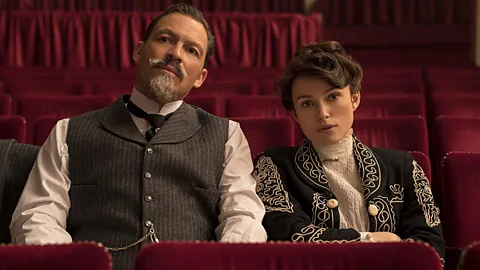Colette film review: How radical is the new biopic?
 Number 9 Films
Number 9 FilmsKeira Knightley stars as Colette in the film about a taboo-busting writer. Does it match the brio of its subject?
She might have been born in the late 19th Century, but Sidonie-Gabrielle Colette is a heroine for our times: a fearless, creative woman who challenged the patriarchy in stuffy Parisian society, in supposedly liberal artistic circles, and in her own bedroom. It’s fair to say that she fought for the principles of the #MeToo and #TimesUp movements. And if anyone had been forward-looking enough to invent hashtags a hundred years ahead of schedule, she might have been the person to do it.
More like this:
Her lavish and timely new biopic, Colette, is nowhere near as bold as she is, unfortunately, but it is bound to win her a new generation of irers, and it could well win an award or two for its cast. Its director and co-writer, Wash Westmoreland, made Still Alice, the Alzheimer’s drama for which Julianne Moore bagged a best actress Oscar in 2015. Hoping, perhaps, for similar recognition, Keira Knightley is plucky and energetic as Gabrielle, a village girl who is whisked from rural Burgundy to the chandeliered theatres and salons of Paris by a sophisticated older man, Henry Gauthier-Villars (Dominic West, sporting a devilish beard and moustache).
His upper-crust friends can hardly believe that such an incorrigible boulevardier is finally settling down, and with a provincial country girl at that, but the odd couple’s marriage doesn’t stop his philandering. And when Gabrielle catches him with his mistresses, he protests that he is simply doing what all men do; even though the characters all speak English with English accents, there’s no doubting that they’re French.
Gauthier-Villars’ professional life is as unorthodox as his personal one. He is a writer, known around town by his nom de plume, “Willy”, but he doesn’t do much writing himself. A kind of proto-James Patterson, he has established his own brand, and now pays other people (or, at least, promises to pay them) to knock out his articles and reviews for him. When he decides to move onto novels, he pushes Gabrielle to write a semi-autobiographical of her schooldays, and then polishes it up and puts his own name on the cover.
After the novel, Claudine At School, becomes a bestseller, Willy exploits Gabrielle in two almost contradictory ways at once. He markets her to the press as “the real Claudine”, so the people of Paris come to believe that there is no difference between her and her fictional creation; but he also takes sole credit for the book. In the circumstances, he could easily have been portrayed as an out-and-out villain, but Willy is so brazen about his caddish behaviour that Gabrielle, and the viewer, can’t help but forgive him.
West’s lovably hearty, buffoonish performance is a big factor here: he seems to be channelling Oliver Reed at his most ebullient. Besides, Willy isn’t all bad. By locking his wife in a room and forcing her to write, he unlocks her literary talent. And by sleeping with other women, he teaches her that she can sleep with other women, too.
The film paints a nicely nuanced portrait of an unconventional marriage in which love and respect survive, however wounded they are by jealousy and betrayal. Nonetheless, the time comes when Gabrielle has to make her own way, not only by breaking away from her controlling husband, but by letting the world know that she is Claudine’s creator. To put it another way, she has to prove that a woman doesn’t need a Willy to be a success.
All these decades later, the determined Gabrielle still comes across as startlingly modern, and it is the film’s preoccupation with modernity which makes it so fascinating: the new century buzzes with new ideas, and we keep hearing about mass-media celebrity, the blurring of gender identities, the crazes for physical fitness and eastern-inspired dancing, and the coming of electric lighting to fin-de-siecle Paris. But, as revelatory as it is, the film itself has almost none of that thrilling modernity.
It jolts into life during one farcical sequence in which both Willy and Colette are having secret affairs with the same American heiress (Eleanor Tomlinson), and again when Claudine-mania roars through Paris, inspiring fashion trends and prompting Harry Potter levels of spin-off merchandise. But otherwise Colette lacks the cheek and brio which Baz Luhrmann brought to a similar Belle Epoque milieu in Moulin Rouge, and which Yorgos Lanthimos brings to another costume drama about sapphic rule-breaking, The Favourite, released later this year. Westmoreland’s film is a picturesque trot from one episode to another, with lively performances, gorgeous frocks, idyllic scenery, and a twinkly orchestral score, but it never quite finds a shape or a style of its own. It looks like a high-end television series and feels like a Wikipedia page.
It’s a shame that Colette isn’t as radical as its heroine. But maybe its straightforward, unchallenging approach will attract a wider audience to her taboo-busting adventures – and there is something radical about that.
★★★☆☆
If you would like to comment on this story or anything else you have seen on BBC Culture, head over to our Facebook page or message us on Twitter.
And if you liked this story, sign up for the weekly bbc.com features newsletter, called “If You Only Read 6 Things This Week”. A handpicked selection of stories from BBC Future, Culture, Capital and Travel, delivered to your inbox every Friday.
